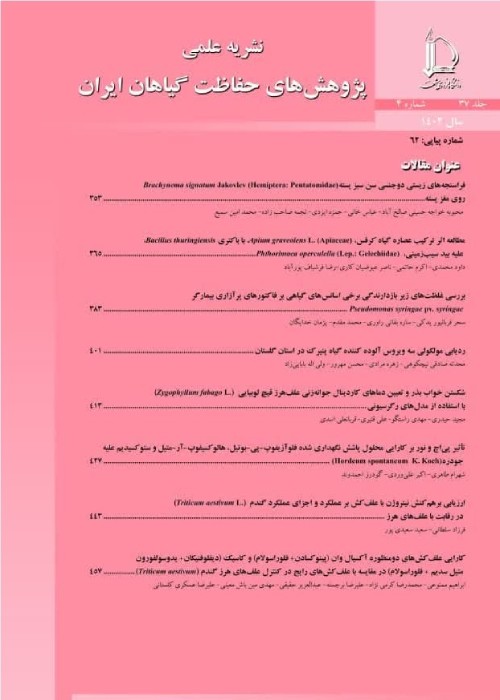Evaluation of some Trichoderma spp. Protease and Lipase Activity and Its Effect on Biocontrol of Tomato Root-knot Nematode (Meloidogyne javanica)
Among crop culture, tomato (Lycopersicum esculentum L.) is an important vegetable crop that grown throughout the world in open as well as protected cultivation. Iran ranks sixth among tomato producing countries. One of the biggest challenges in modern agriculture worldwide, is the management of soil-borne plant pathogens, including plant-parasitic nematodes. Among plant parasite nematodes, root-knot nematode genus Meloidogyne spp. (RKN) is one of the most important nematodes in a wide spectrum of crops that causes serious damage in most agricultural crops worldwide. The eggshell of root-knot nematode is containing 50% protein, 30% chitin and 20% lipid and Species of Trichoderma due to the production of the high level of many hydrolytic enzymes, are used as \ biocontrol agents of plant pathogens.
In the current study, extracellular protease and lipase activity of 15 isolates of four species of Trichoderma spp. including T. harzianum, T. virens, T. konigii and T. saturnisporum were investigated to their biocontrol effects on tomato root-knot nematode in the greenhouse. These Trichoderma isolates were cultured on Potato Dextrose Agar (PDA) media for 7 days and were used to prepare inoculation of Trichoderma. In order to prepare Trichoderma inoculum, we used sterilized wheat as the substrate contains Trichoderma fresh culture and after that incubated in 28ºC for 12 days. The Meloidogyne javanica pure population was prepared and tomato seedlings were inoculated with 2000 of the fresh egg of nematode and 1×107 different Trichoderma strain conidia and were kept in greenhouse conditions. The enzyme activity was assessed based on the colorimetric method using a special substrate as the only energy source for Trichoderma isolates. We used casein as the substrate for protease and extra-pure olive oil as the substrate for lipase activity assessment.
According to the enzyme activity results, the highest protease activity was in the isolates T. harzianum BI, T. virens T65 and T. virens T64 and the lowest protease activity was in isolates T. harzianum T16A, T. saturnisporum T12 and T. saturnisporum T12N, respectively. The highest lipase activity was in T. harzianum T19, T. virens T6 and T. virens T65 and the lowest lipase activity were in T. harzianum T14N, T. harzianum T16A and T. harzianum T16. Based on the greenhouse results, T.BI, T65 and T6 isolates were the highest effective isolates and T12N, T12 and T16 reported as the lowest effective isolates in the biocontrol of root-knot nematode on infected tomato plants. Also, according to the results of correlation between protease and lipase activity and nematode reproduction factor, the correlation coefficient between enzyme activity and nematode reproduction factor for protease activity measured R2=0.83 and for lipase activity measured R2=0.42 which given the constituents of the root-knot eggshell and larvae cuticle that contains high amounts of protein, this is understandable. There are many reports about the effects of protease and chitinase on the induction of resistance against plant pathogens in plants. An investigation on the effect of Trichoderma isolates extracellular protease level on the biocontrol ability of these isolates against tomato root-knot nematode showed that the higher number of protease-encoding genes copies increases the biocontrol ability of these isolates.
Root-knot nematode is one of the most important damaging agents on tomato plants. It is difficult to control this endo-parasite nematode because of its wide host range, short life cycle, and high reproductive potential. The activation of the plant's own defense system through biotic and abiotic agents, called elicitors, has been considered as a focus of research only in recent years for the control of plant pathogens. The resulting elevated resistance due to an inducing agent upon infection by a pathogen is called induced systemic resistance (ISR) or systemic acquired resistance (SAR). Several abiotic and biotic agents have been reported to induce resistance against plant-parasitic nematodes. So far, many pieces of research have done on the use of different species of Trichoderma as biological control agents of plant pathogens. The ability to produce high amounts of chitinase, protease and glucanase enzymes made this isolates as a biocontrol agent of a wide range of plant pathogens. Overall, there is no sure whether or not a biocontrol agent is successful in controlling a particular pathogen, and many variables influence the success rate of biocontrol agents in natural environments.
- حق عضویت دریافتی صرف حمایت از نشریات عضو و نگهداری، تکمیل و توسعه مگیران میشود.
- پرداخت حق اشتراک و دانلود مقالات اجازه بازنشر آن در سایر رسانههای چاپی و دیجیتال را به کاربر نمیدهد.


